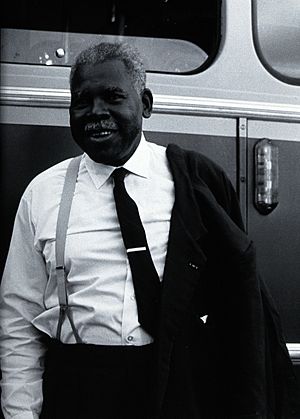Hildrus Poindexter facts for kids
Quick facts for kids
Hildrus Augustus Poindexter
|
|
|---|---|
 |
|
| Born |
Hildrus Augustus Poindexter
May 10, 1901 |
| Died | April 21, 1987 (aged 85) |
| Education |
|
| Scientific career | |
| Fields | Tropical diseases Bacteriology |
Hildrus Augustus "Gus" Poindexter (May 10, 1901 – April 21, 1987) was an important American scientist. He was a bacteriologist, which means he studied tiny living things like bacteria. He focused on how tropical diseases spread, especially in hot climates. Hildrus was one of eleven children. His father, Fred Poindexter, was born into slavery. His mother, Luvenia Gilbert, was born free. Hildrus grew up on a farm, learning about farming tasks from a young age.
Contents
Education and Learning
Hildrus Poindexter loved to learn. He went to Lincoln University and finished his studies there in 1924. A year later, he attended Dartmouth Medical School. He then went to Harvard Medical School, where he earned his M.D. degree in 1929. An M.D. means he became a medical doctor.
He continued his education at Columbia University. There, he earned a master's degree (A.M.) in microbiology in 1930. He then got his Ph.D. in microbiology and immunology in 1932. This means he became an expert in studying tiny living things and how the body fights off sickness. He also earned another master's degree (M.S.P.H.) in public health and tropical medicine from Harvard University in 1932.
A Career Helping Others
In 1931, Dr. Poindexter joined the Howard University Medical College. He started as an assistant professor, teaching about microbiology and public health. By 1936, he became a full professor and led the department.
During World War II, he joined the United States Army in 1943. He became a top expert on Malaria and other tropical diseases. Malaria is a serious disease spread by mosquitoes. Dr. Poindexter worked hard to reduce malaria infections among soldiers. He left the army as a lieutenant colonel and received a Bronze Star Medal for his important work.
After the army, he continued to serve in the United States Public Health Service. In 1947, he was sent to Liberia in West Africa. His job was to lead a team helping the Liberian government. They worked on improving sanitation and controlling infectious diseases. He became the director of this mission in 1948.
Dr. Poindexter's work took him all over the world. In 1953, he moved to Indochina. He also served in countries like Vietnam, Suriname, Iraq, Libya, and Sierra Leone. He later returned to teach at Howard University. While there, he helped many younger scientists, including Jane Hinton and Ruth Ella Moore.
In 1973, Dr. Poindexter wrote a book about his life called My World Of Reality. In it, he shared his experiences, including challenges he faced due to racial prejudice. For example, he was offered membership in a scientific society, but the offer was taken back when they learned he was Black.
Groups He Belonged To
Dr. Poindexter was a member of several important groups. He was a Prince Hall Mason. He was also part of the American Society of Microbiology. He belonged to the Omega Psi Phi fraternity.
Awards and Special Recognition
Dr. Poindexter received many awards for his hard work. In 1944, he earned the Bronze Star during his military service. He also received four major Combat Stars.
In 1962, he made history. He became the first known Black scientist to be certified in microbiology by the American Board of Medical Microbiology. This was a big achievement, and he was the 141st person to pass this difficult exam. This certification gave him the special title of Diplomate of the ABMM.
He also received four honorary Doctor of Science degrees from different universities:
- Lincoln University (1946)
- Dartmouth College (1956)
- Howard University (1971)
- The University of Port Harcourt, Nigeria (1982)
 | Chris Smalls |
 | Fred Hampton |
 | Ralph Abernathy |

